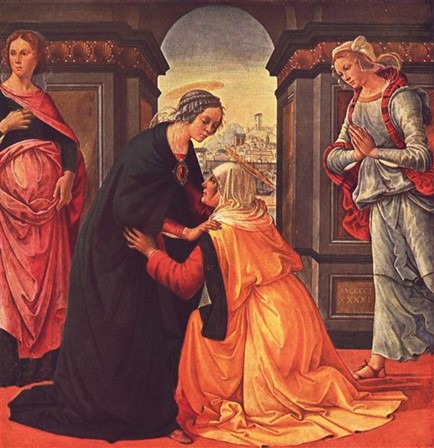“My soul doth magnify the Lord … ”

The exultant Song of Mary, known as the Magnificat from the opening word in the Latin text, is the standard canticle for the evening office in the West, whether Roman Catholic vespers or Anglican evening prayer or evensong. Yet its history in our Prayer Book tradition has been rather more checkered than one would expect for a text so firmly established by Medieval tradition and drawn directly from Scripture (Luke 1:46-55). The canticle, whether arising out of the Blessed Virgin Mary’s heart or out of St. Luke’s artistry, was clearly inspired by the song of Hannah in I Samuel, in response to God’s answering her earnest plea for a son (I Samuel 2:1-10).
The career of the Magnificat at the evening office of the Prayer Book began rather unremarkably: being the sole canticle at Medieval vespers, it of course was appointed to follow the first lesson at evensong in the first Prayer Book of 1549, in the translation of the Great Bible of 1539, the wording still current in Rite I of the 1979 BCP (p 65). Beginning with the second Prayer Book, that of 1552, the Magnificat begins to get jostled. For the 1552 BCP provides a second option, Psalm 98 (Cantate Domino), which remains as such to this day in the English Prayer Book of 1662. It seems the extreme Protestants harbored “prejudice against use of Gospel canticles, of this one particularly.”* Weird.
As if that were not weird enough, the first American Prayer Book, of 1789, dropped the Magnificat altogether, replacing it with two psalm options, Psalm 98 or Psalm 92 (though only verses 1–4). Why? Extreme Protestants did not dominate the revision process at that time; nor can I imagine that Deists or Latitudinarians would have objected overmuch, or at all, to this Gospel canticle and the Nunc Dimittis, which was also dropped from Evening Prayer. So, for a century, no Gospel canticle was offered in the evening office of the American Episcopal Church. Happily, both were restored to the 1892 BCP, but with alternatives (Ps. 98 or 92:1–4 for the Magnificat and Ps. 67 or 103:1-8 for the Nunc Dimittis). Thus it remained in the 1928 BCP. The 1979 BCP prints both Gospel canticles in Evening Prayer alone, though, in a rubric, allowing for use instead of any of the canticles found on pp. 47–52 or 85–95.
This canticle needs to be sung out daily for herein is proclaimed God’s radical vindication of the lowly and the hungry, with a concomitant complete inversion of the world’s values. So radically does this canticle challenge the world’s oppressive hierarchy that in the early 19th Century, the East India Company banned its recitation at evensong in India lest it incite the natives; and then Gandhi requested that the Magnificat be recited wherever the British flag was being lowered on the final day of imperial rule over India in 1948. May we have the grace in our day to recite this canticle from the heart and enter fully into its radical spirit that we may be inspired to live out that vision of the Kingdom of God bursting into our midst.
Faithfully,
William Bonnell
*Marion Hatchett, Commentary on the American Prayer Book (Seabury Press, 1980) p 115. Unfortunately, Hatchett presents no rationale for their utterly perplexing objection to a text drawn right from Scripture. Could their objection to this canticle have been fueled by their virulent anti-Marianism?
